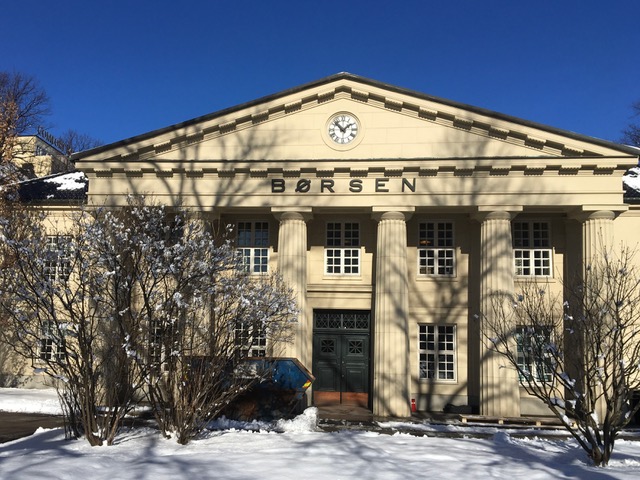It was another turbulent day on the Oslo Stock Exchange and most others around the world, as new economic uncertainty grips the markets. The price of Norway’s North Sea crude oil fell again and its currency remains weak, boosting predictions that interest rates will rise again next week.

Norway’s central bank has long stressed how the Norwegian economy has remained strong despite all the turbulence in recent years. Norwegian companies have produced record high earnings, especially the biggest ones in which the state has substantial stakes. Oil and energy company Equinor, the country’s largest bank DNB, telecoms firm Telenor, industrial firms Yara and Norsk Hydro, power producer Statkraft and defense contractor Kongsberggruppen have all reported huge profits recently, pumping not just tax revenue but also lots of dividend income into state coffers.
The company responsible for the state’s own direct stakes in oil and gas fields, Petoro, was the latest to report earnings this week that were nearly triple the last record set in 2021: a dizzying NOK 528 billion. Petoro is the largest owner of the Troll field in the North Sea, and then came reports of new oil and gas discoveries nearby. More riches can thus be expected.
Most of the profits recorded by the big Norwegian companies in which the government has major stakes are tied to high prices for energy of all types. Government officials have seemed keen to downplay Norway’s war profits, and defend a need for tight state budgets, but newspaper Dagens Næringsliv (DN) doesn’t shy away from headlines like the one attached to its report of defense industry firm Kongsberg’s earnings last month: “War and crises yield records.” The company could report double-digit profit hikes and growth in all its areas, maritime, defense, aerospace and digital.
When Equinor reported its enormous profits a few weeks ago, the head of Norway’s huge sovereign wealth fund that’s fueled by oil revenues sent a “thank-you” text message to Equinor boss Anders Opedal, to which he simply replied “vær så god,” roughly equivalent to “you’re welcome.”

Oil and gas prices have fallen lately, though, with North Sea crude down to around USD 73 a barrel in Thursday afternoon trading, and that almost always hurts the value of Norway’s currency, the krone. It’s already been at its weakest levels against the US dollar for decades and it sagged again on Thursday. At one point it cost NOK 10.83 to buy one US dollar. That compares to just NOK 6.5 during most of the 1990s and 2000s despite some highs and lows. It’s also sagged against the euro, making holidays in Europe or the US quite expensive for Norwegians at present.
This year got off to the weakest start ever for the krone and analysts can’t fully explain it. Oil prices are still higher than they were on earlier occasions when the krone was strong. Some point to speculation among currency traders, but one thing is clear: A weak krone makes it even more likely that Norway’s central bank will opt to boost interest rates next week after another meeting of its committee that addresses such matters.
Nearly all economists at Norway’s biggest banks and professors expect at least another quarter-point rise, not least because Norges Bank and its new governor Ida Wolden Bache want to bring down inflation. Elisabeth Holvik, chief economist at Sparebank1, said last week that she expects a “double” increase (of a half-point) as a means of boosting the krone at the same time.
“Norges Bank has underestimated the strength of the Norwegian economy,” DNB Markets’ chief economist, Kjersti Haugland, told DN already last month. To cool things down, she thinks, Bache and her colleagues need to boost interest rates. Norway’s mainland GNP rose by 3.8 percent last year, according to state statistics bureau SSB, and that was higher than earlier estimates.
With Norway’s key policy rate now at 2.75, a boost to either 3- or 3.25 percent can result in mortgage rates of 5 percent. Even though that’s still low compared to those in the late 1980s and well into the ’90s, it can put a squeeze on borrowers used to the extraordinarally low rates of recent years.
“There’s almost nothing that can bring down interest rate expectations,” Haugland told DN. “Everthing is pushing them up. This can be a new shock for households.” She also predicts interest rate hikes later this year, topping out at 3.75 percent in the third quarter.
Not only are mortgage rates rising, so are rental rates especially in Oslo where a two-room apartment cost an average NOK 15,005 in January. That’s up 7.7 percent from a year earlier and roughly in line with recent inflation figures.
Bache’s job at Norges Bank is to ensure low and stable price growth, which the bank still wants to keep at just around 2 percent. She and her colleagues thus have a big challenge, since inflation has hit its highest levels since the 1980s, when it helped push interest rates well into the double-digits. Inflation had already hit 5.8 percent last year and 6.4 percent in January before settling around 5.9 percent last month.
Last week SSB released new prognoses for the Norwegian economy, which it thinks is at a crossroards right now. SSB thinks the steep price hikes consumers have faced at the grocery store and on their electricity and tax bills will ease while unemployment will rise from an extraordinary low (1.9 percent in January). Even though housing prices rose again last month, most brokers predict they’ll also ease along with most others. Then Bache and her colleagues would be able to breath a sigh of relief that their interest rate hikes have helped and haven’t been as steep as some critics contend. Their next interest rate announcement is due on March 23.
NewsinEnglish.no/Nina Berglund

